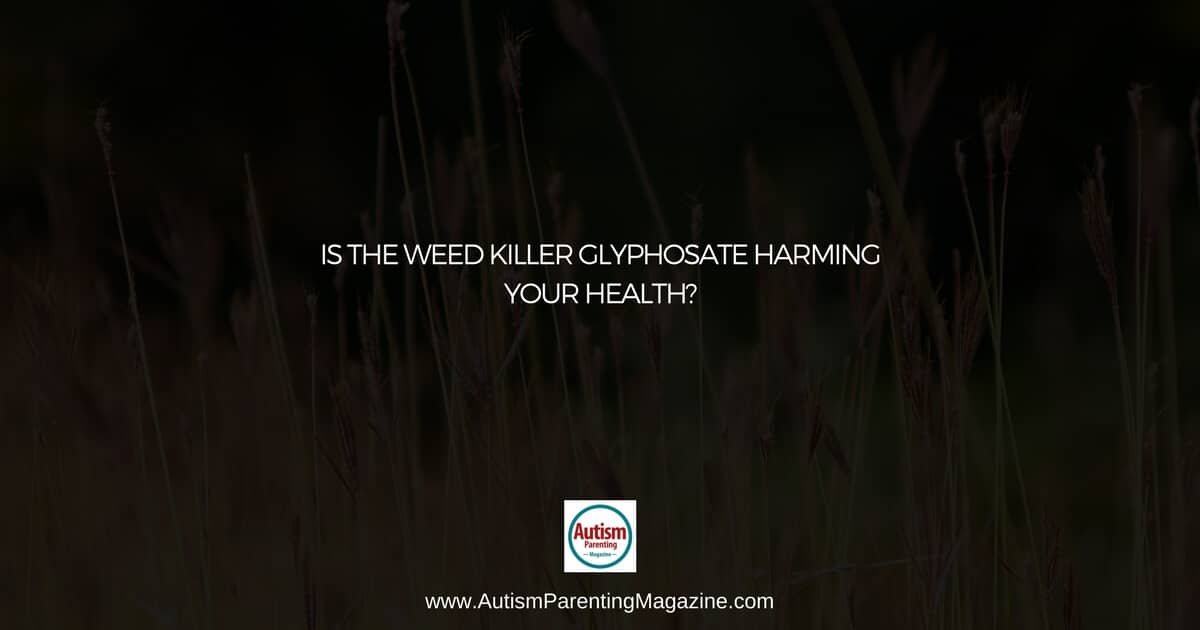According to an article in Autism Parenting Magazine entitled "Is the Weed Killer Glyphosate Harming Your Health?" it states that over the last 30 years there has been a steady increase in autism. A cause for this would have to be something that wasn't there at the beginning of the trend and steadily increased. The author of this article had been studying autism and looking for its cause for 25 years.
It was found that people with autism had high levels of dopamine in their urine. The degree of autism severity was related to how high the dopamine metabolite level was. The higher it was the more severe the case of autism was.
The author found high levels of a substance identified as 3-(3-hydroxyphenyl)-3-hydroxypropionic acid (HPHPA) in autistic patients urine samples. HPHPA is a metabolite of Clostridia bacteria. Clostridia has been found to be markedly increased in people with autism. HPHPA inhibits the conversion of dopamine to norepinephrine, which requires the enzyme dopamine-beta-hydroxylase (DBH) to do so. Because certain phenols such as HPHPA (and others) prevent DBH from working dopamine may build up to high abnormal levels that alter the structure and function of the brain. The author concludes that "This connection between Clostridia and elevated dopamine is so prevalent in autism that elevation of Clostridia species is almost surely the major cause of severely abnormal behavior in autism."
So what does this have to do with glyphosate? Glyphosate kills the good bacteria in our bodies that help to control bad pathogenic bacteria like Salmonella and Clostridia, which are resistant to glyphosate. These bad glyphosate resistant bacteria proliferate and produce toxins like HPHPA. The author charts the growth of autism with the use of glyphosate and finds a similar correlation.
Zen Honeycutt, founder of Moms Across America, had a son who was showing signs of autism. She had him tested for glyphosate and found the levels in his system to be very high. She switched to glyphosate free organic foods and all symptoms of autism disappeared. This has been found to be true in many other cases where parents switched to feeding their autistic kids organic foods. So why isn't this "cure" more well known? Because glyphosate appears to be related to the development of autism why do we continue to allow the use of this chemical? Why aren't we shouting about this "cure" for autism from the rooftops? Why must more and more children risk developing this illness? Why must parents suffer as they watch their children develop autism and their case become more and more severe?
The chemical companies say that herbicides and pesticides are necessary if we are to feed America in the future. One farmer, whose family had been farming for years, believed his father died from atrazine poisoning. He said he switched to regenerative organic farming when he realized that he wasn't feeding America, he was poisoning it.
Please join Zen Honeycutt at momsacrossamerica.com in their effort to inundate the EPA with letters to ban glyphosate.
It was found that people with autism had high levels of dopamine in their urine. The degree of autism severity was related to how high the dopamine metabolite level was. The higher it was the more severe the case of autism was.
The author found high levels of a substance identified as 3-(3-hydroxyphenyl)-3-hydroxypropionic acid (HPHPA) in autistic patients urine samples. HPHPA is a metabolite of Clostridia bacteria. Clostridia has been found to be markedly increased in people with autism. HPHPA inhibits the conversion of dopamine to norepinephrine, which requires the enzyme dopamine-beta-hydroxylase (DBH) to do so. Because certain phenols such as HPHPA (and others) prevent DBH from working dopamine may build up to high abnormal levels that alter the structure and function of the brain. The author concludes that "This connection between Clostridia and elevated dopamine is so prevalent in autism that elevation of Clostridia species is almost surely the major cause of severely abnormal behavior in autism."
So what does this have to do with glyphosate? Glyphosate kills the good bacteria in our bodies that help to control bad pathogenic bacteria like Salmonella and Clostridia, which are resistant to glyphosate. These bad glyphosate resistant bacteria proliferate and produce toxins like HPHPA. The author charts the growth of autism with the use of glyphosate and finds a similar correlation.
Zen Honeycutt, founder of Moms Across America, had a son who was showing signs of autism. She had him tested for glyphosate and found the levels in his system to be very high. She switched to glyphosate free organic foods and all symptoms of autism disappeared. This has been found to be true in many other cases where parents switched to feeding their autistic kids organic foods. So why isn't this "cure" more well known? Because glyphosate appears to be related to the development of autism why do we continue to allow the use of this chemical? Why aren't we shouting about this "cure" for autism from the rooftops? Why must more and more children risk developing this illness? Why must parents suffer as they watch their children develop autism and their case become more and more severe?
The chemical companies say that herbicides and pesticides are necessary if we are to feed America in the future. One farmer, whose family had been farming for years, believed his father died from atrazine poisoning. He said he switched to regenerative organic farming when he realized that he wasn't feeding America, he was poisoning it.
Please join Zen Honeycutt at momsacrossamerica.com in their effort to inundate the EPA with letters to ban glyphosate.

